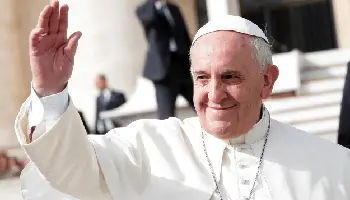Pope Francis’s Death Renders $1 million in Bets Null, Sparking Controversy

iGaming News, Casino Reviews and Games

Pope Francis’ passing on April 21, 2025, sent the betting industry into overdrive. Who would have predicted such a thing? Over $1 million worth of bets placed on offshore betting sites, including Polymarket and Zeitgeist, lost out as they did not foresee the date of the Pope’s death. Bettors took guesses on everything from the date to the cause, especially after pneumonia had recently taken a toll on Francis’ health.
As the Vatican grieves and plans for a historical funeral, the controversy surrounding these bets has sparked conversations about morals, rules, and what lies ahead for prediction markets. Here’s what happened, why it has sparked discussions, and what it means for the iGaming industry.
A Million Dollars Down the Drain
Pope Francis died from a stroke and cardiac arrest at 88 years of age, a day after blessing crowds at St Peter’s Square. His death caught many by surpise—including bettors. There was a flurry of activity on the crypto prediction site Polymarket for bets on whether Francis would die before April 30, 2025, or on that exact date. Another blockchain site called Zeitgeist had markets on the cause of death, including pneumonia or heart failure. With the news confirmed by the Vatican that the bishop had suffered a stroke-induced coma and heart failure, most bets ended up being wrong, voiding $1 million in bets, per CBS News.
These were not casino bets, but part of “prediction markets” where users bet in cryptocurrency on real-world outcomes, such as elections and celebrity events. According to Axios, Polymarket's betting model attracts a young, tech-savvy crowd, with 65% of its U.S. users aged 18–34, who utilize stablecoins like USDC. Speculation about the Pope’s health was intense after he got double pneumonia and had a month-long hospital stay in February 2025, leaving the punters with nothing. X posts from @CryptoBetting vented frustration, with one user griping, “Lost 0.1 BTC on a pneumonia bet—didn’t see stroke coming.”
The Ethics of Betting on Death
Gambling on the death of a pope is not unheard of but still controversial. The online offerings in question are hosted on unregulated offshore platforms. According to Reuters, a Vatican spokesperson from the Catholic Church denounced the bets as “disrespectful and morally reprehensible” because they exploit a sacred moment. Groups like the National Council on Problem Gambling felt the same, warning that such markets normalize gambling on tragedy.
Critics on social media platforms, such as @FaithEthics, labelled the bets “ghoulish” and wondered why they are allowed. However, others consider prediction markets as a type of free expression and economic forecasting. Shayne Coplan, CEO of Polymarket, stated to Forbes that these markets were intended to aggregate people’s sentiment, not to offend anyone. He also mentioned that these markets are used to predict election outcomes with an accuracy of 80%. Even so, the loss of $1 million highlights the risks; some of those betting did not understand that offshore sites do not offer U.S. consumer protections, so there are no mechanisms in place to resolve disputes.
How Prediction Markets Work
Prediction markets, unlike traditional sportsbooks, enable users to bet on or predict specific outcomes or events. A betting chance offered by Polymarket to Pope Francis was whether the Pope will die before 2025 or not. The odds shifted one way or the other as news of his health became available.
These platforms use blockchain for transparency and digital currencies for anonymity. Polymarket uses smart contracts to automate payments, though the platform operates without regulatory oversight. Thus, a concern about manipulation arises, says CoinTelegraph. A warning issued by the CFTC in 2024, as quoted by Bloomberg, noted that these sites were violating U.S. gambling laws. However, they are offshore and remain very accessible. Given that some users lose hundreds on a single contract, the $1 million in voided bets attracts attention to the high stakes.
Ripple Effects on iGaming and Regulation
Betting on the Pope's death put a spotlight on the regulation of iGaming. Only seven states in the U.S. allow online casino gambling yet none allow prediction markets. While offshore sites currently fill the gap, they are a legal minefield. In March 2025, New Jersey received a whopping $243.9 million in legal iGaming revenue which shows a steady growth in the local industry. Regulators are also clamping down on unregulated sites, for instance, Pennsylvania’s 2025 ban on sweepstakes, as reported by Yardbarker.
Like many Countries Globally, Thailand is tightening its rules too. According to G3 newswire, the recent casino bill has been delayed due to allegations of money laundering. The Pope controversy might cause regulators to focus on prediction markets. According to player feedback, this could serve as a wake-up call for stricter regulations of crypto gambling, although others believe these markets are too small to justify extensive rules. For the time being, markets for events such as “the next pope” remain open on platforms like Polymarket, with new markets already launched featuring Cardinal Luis Antonio Tagle at odds of +100.
Conclusion
Pope Francis’ death on April 21, 2025, wiped out over $1 million in prediction market bets and exposed the world of offshore gambling. While platforms like Polymarket and Zeitgeist thrive on crypto and anonymity, criticism and resistance from religious groups and regulators underscore the thin line between free markets and moral imperatives. While the Vatican grieves and punters pivot to the next pope, these events show how iGaming is growing.

Bailey Haun
iGaming News, Casino Reviews and Games
I’m a passionate writer with over a decade of experience in the online gambling industry. Specializing in casino reviews, news, and game strategies. My background in journalism allows me to analyze casinos critically, focusing on key aspects like bonuses, game selection, and customer service.
